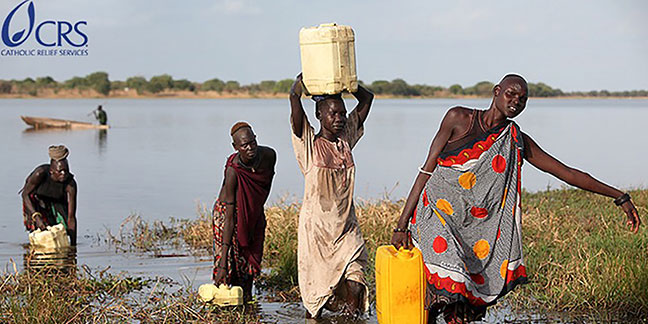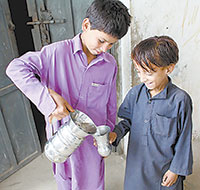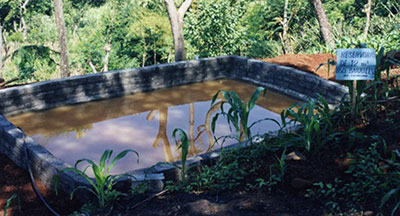 Water is essential to life, but for nearly a billion people access to clean freshwater is limited or non-existent.
Water is essential to life, but for nearly a billion people access to clean freshwater is limited or non-existent.
According to a February 2018 World Health Organization report (using 2015 global data), 71 percent of the global population (5.2 billion people) used a drinking-water service located on premises, available when needed, and free from contamination. An additional 18 percent of people had access to an improved water source located within a 30-minute round trip from their home, although this water was not necessarily free from contamination. However, an estimated 844 million people lacked even a basic drinking-water service – including 159 million people forced to access untreated surface water (such as rivers, streams and lakes) and 423 million people who had to obtain water from unprotected wells and springs.
Lack of access to clean freshwater leads to hundreds of thousands of deaths annually from waterborne illnesses, and countless millions of people spending days and weeks in agony fighting such illnesses.
Highlighting this problem is the intent of “World Water Day.” World Water Day has been internationally observed since 1993, with March 22 being the day officially assigned by the United Nations General Assembly for this observance.
Pope Francis has used this annual observance to join with other global leaders in calling for a world where all people have access to clean water for drinking, cooking and hygienic purposes, and enjoining the international community of nations to respect and promote access to clean water as an essential and fundamental human right.
This right has been espoused in Catholic social teaching, summarized as: “The right to water, as all human rights, finds its basis in human dignity and not in any kind of merely quantitative assessment that considers water as a merely economic good. Without water, life is threatened. Therefore, the right to safe drinking water is a universal and inalienable right” (excerpted from “The Compendium of the Social Doctrine of the Church,” Pontifical Council for Justice and Peace, 2004).
The varied themes of World Water Day each year guide nations and humanitarian agencies as they highlight the challenges faced by many around the earth to obtain clean freshwater and work for greater sustainable management of limited freshwater resources.
This year’s theme is “Leaving no one behind,” which echoes the Church’s “preferential option for the poor” as it calls upon the global community to consider people who have been marginalized and have restricted or no access to clean water. Women, children, older adults and those with disabilities often find their needs come last when the scramble for limited clean water pushes people to the periphery. For many people, access to clean water is denied because of discrimination, war and forced displacement or confinement.
In his message for this year’s World Water Day, Pope Francis reflected on the concern of those “left behind” in the access to clean water: “Water is an essential good for the balance of ecosystems and human survival, and it is necessary to manage it and take care of it so that it is not contaminated or lost. It may be seen in our days how the aridity of the planet is extending to new regions, and more and more are suffering as a result of the lack of water sources suitable for consumption. For this reason, ‘leaving no one behind’ means committing ourselves to putting an end to this injustice. Access to this good is a fundamental human right, which must be respected, because the life of the people and their dignity are at stake.”
His message continued: “Leaving no one behind also means being aware of the need to respond with concrete facts; not only with the maintenance or improvement of water structures, but also by investing in the future, educating new generations in the use and care of water. This task of raising awareness is a priority in a world in which everything is discarded and disdained, and which in many cases does not appreciate the importance of the resources we have at our disposal.”
Get involved
 Two boys drink clean water made possible by a CRS project. After massive flooding destroyed water systems throughout northern Pakistan, CRS helped villagers construct or repair thousands of meters of pipeline.Catholics are able to join in supporting the yearly observance of World Water Day through their support of Catholic Relief Services, the U.S. Catholic community’s humanitarian relief and development agency sponsored by the U.S. bishops.
Two boys drink clean water made possible by a CRS project. After massive flooding destroyed water systems throughout northern Pakistan, CRS helped villagers construct or repair thousands of meters of pipeline.Catholics are able to join in supporting the yearly observance of World Water Day through their support of Catholic Relief Services, the U.S. Catholic community’s humanitarian relief and development agency sponsored by the U.S. bishops.
CRS serves vulnerable people oversees by developing and improving sources of clean water for drinking. cooking, washing, caring for livestock and irrigation.
In 2018, 7.2 million people benefited thanks to clean water and sanitation projects organized through CRS. CRS is also one of many humanitarian agencies calling for “a water secure world for all” by 2030.
Earlier this month, Thomas Awiapo, a CRS employee from Ghana, visited several schools in the Diocese of Charlotte and spoke of his childhood living in poverty, a childhood in which he was always close to starvation. He recounted how he had no choice but to drink from a nearby river. There he would see animals in the water, and though the river made people sick (and “some died from their sickness,” he lamented), there was no other choice. “I was thirsty,” Awiapo said.
With nutrition and education provided through CRS Rice Bowl-funded programs, Awiapo was raised out of destitution to eventually work for CRS. He now travels around the U.S. to express his gratitude to Catholics in America and share how Rice Bowl helps provide food and clean drinking water to vulnerable communities around the world.
— Joseph Purello, Special to the Catholic News Herald. Joseph Purello is director of Catholic Charities’ Office of Social Concerns and Advocacy and diocesan director for CRS.
Pictured: Women collect water from a river in Terakeka, Sudan. Villagers drink water from the river, which often results in stomach ailments and causes them to urinate blood. CRS constructed a borehole that provided enough fresh water for 500 families, or 2,500 people, for up to 50 years. In total, CRS will build 15 boreholes and repair another five in Terakeka. CRS will also train community members in hygiene promotion and water pump repair. (Photos provided by Catholic Relief Services)
 In El Salvador, this rain trap was used to collect water that can be used to water crops.
In El Salvador, this rain trap was used to collect water that can be used to water crops.


